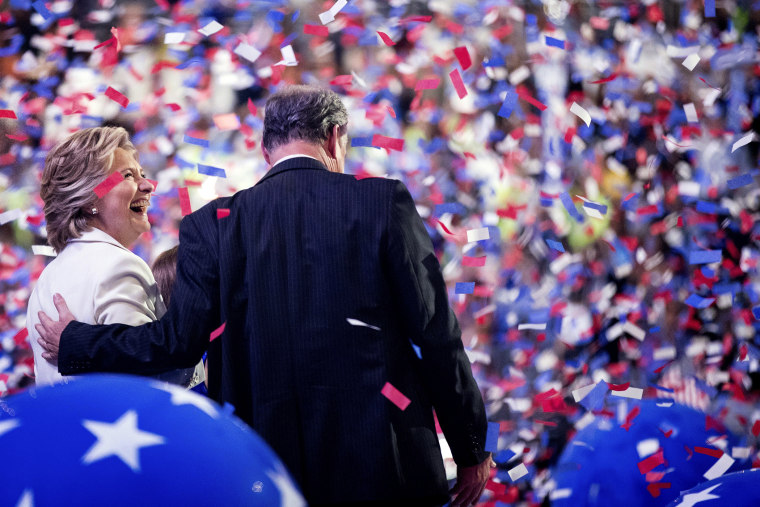Nothing has been normal about the 2016 presidential election, so perhaps we shouldn't be surprised by the major-party conventions, but few political observers seemed fully prepared for bookend gatherings in which the parties' messages defied all expectations.
The Washington Post had a good piece on this overnight.
The country's two major political parties, emerging from their conventions to square off in the general election, are speaking to Americas unrecognizable to each other in voices that sound like a political and ideological role reversal. For Republicans, the country is a place of near-apocalyptic gloom whose best days are fast receding.
The GOP's America is a depressing and divided place, facing existential threats around every corner, gripped by "chaos" and a sense of hopelessness. The Democratic America "is a vibrant and diverse place," with a bright future the country can move towards with great confidence.
The gap between the two perceptions is stunning, but so too are the parties' willingness to play against type. Even if you didn't see all of the Democratic convention, you probably picked up on some of the key themes -- patriotism, optimism, family, future, unity -- built around the Clinton campaign's "Stronger Together" slogan.
Vox noted yesterday that Democrats "have stolen the GOP's best rhetoric -- and Republicans have noticed."
I've seen more than a few observers note that, at times, the Democratic convention resembled a Republican convention from years past. Multiple speakers, including Barack Obama and Hillary Clinton, made Reagan references. A retired admiral, noting the Republican nominee's denigration of POWs, said from the stage, "I served in the same Navy as John McCain. I used to vote in the same party as John McCain. Donald, you are not fit to polish John McCain's boots."
In response, Democrats roared with approval -- just as they did when Doug Elmets told attendees last night, "It's an honor to be here. Candidly, it's also a shock -- because, unlike many of you, I'm a Republican. I'm here tonight to say, I knew Ronald Reagan. I worked for Ronald Reagan. Donald Trump, you are no Ronald Reagan."
National Review's Rich Lowry said this week, "American exceptionalism and greatness, shining city on hill, founding documents, etc -- they're trying to take all our stuff."
It's at this point that many on the left might start feeling a little antsy. After all, when Democrats start sounding like Republicans, it's often a sign of trouble for progressive goals and priorities.
But therein lies the most important point: the Democratic convention focused on a broad public appeal while simultaneously sticking to the most progressive party platform in recent memory.
The Washington Post's Greg Sargent noted, for example, that Clinton "laid out a surprisingly progressive economic agenda," even while making an effort "to show that a progressive economic agenda can be sold to voters who have been drifting to the GOP."
Vox's Ezra Klein was thinking along similar lines, noting this morning, "[I]t turns out that Clinton and the Democrats are indeed embracing the symbolism and tropes that the right has loved -- but they really aren't making policy concessions to win them over. Indeed, all of this imagery and rhetoric was deployed in service of an agenda that is remarkably liberal."
We'll learn soon enough whether this is an elaborate miss-read of public attitudes. Maybe voters aren't in the mood for optimism and confidence. Perhaps Trump really has identified and tapped into widespread American dissatisfaction, and he'll ride a wave of ethno-nationalist fury to the Oval Office.
But Democrats are clearly eager to take the risk, careful threading a rhetorical needle. The party believes there are plenty of Americans who may ordinarily be inclined to support the Republican ticket, but who are looking for an excuse not to under the circumstances.
And with that comes an opportunity. With his unhinged extremism, Trump has created an ideological chasm, making it possible for Clinton and her convention to present ideas that appeal to Bernie Sanders and his supporters, while presenting themes and emotions that reassure centrists and Trump's Republican skeptics.
Today is the first real day of the 2016 general election, and only one of those two candidates is on the right track. After last night, Clinton has reason to like her chances.
